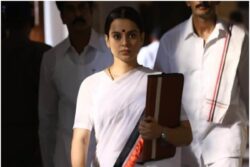Movie Review: Shanghai

Cast: Kalki Koechlin, Emraan Hashmi, Abhay Deol
Director: Dibakar Banerjee
Here at long last is a Hindi film that dares to defy the conventions of its chosen genre. Shanghai is a no-frills but searing political thriller that is under-wired with intelligence and nerve, both cinematic and ideological.
Set in a small town where politics, big business and the underworld are on the same side in an organized conspiracy to deceive an already dispossessed populace, Shanghai pushes mainstream Hindi cinema into the outer flanks of a zone that has traditionally been beyond the ken of those who make movies simply to make a quick killing.
Dibakar Banerjee’s metier lies in crafting films that make more than just attention-grabbing noise. In each of his three previous films (Khosla Ka Ghosla, Oye Lucky Lucky Oye and Love Sex aur Dhokha), he addressed an issue of contemporary relevance without any self-righteous hectoring or unseemly chest-thumping.
His new film demonstrates much the same restraint, besides a touch of wry humour, as it articulates a sense of indignation that is far more acute and intense than it has ever been before in his work.
The precise narrative tone, the aptly chosen visual style and the unvarnished texture lend Shanghai a distinctive cloak. It turns the screws slowly and with intent, never losing sight of the ultimate goal of laying bare the anomalies that plague the world’s largest democracy.
The film articulates a simmering rage at the sorry state of affairs in a country that is purportedly poised on the cusp of economic superpower status, but it does so neither through screechy bluster nor by means of preachy sermons.
The near-inchoate bursts of fear, loathing and anger from hapless victims serve to convey the weight of the crushing burden that ordinary folk must bear in a lopsided system designed for those who control the levers of power.
Adapted from Greek writer Vassilis Vassilikos’ 1966 novel, Z, the film, like the book and the 1969 Costa-Gavras thriller based on it, opens with a political assassination that is made to look like an accident.
A respected left wing activist, Dr Ali Ahmedi (Prosenjit Chatterjee), lands in Bharat Nagar (a nondescript town that believes it can be another Shanghai, a microcosm for all of India) to address a rally against a business park project that will displace hundreds of families against their wish.
On the same flight is a Bollywood starlet who has been flown in to add spice to the launch of business park project. The media cannot have enough of her.
One journalist asks her whether she is still at loggerheads with Priyanka Chopra; another wants her to talk about her next film. “It’s about love and it is set in London,” the wannabe diva pipes up. Dr Ahmedi can barely get a word in edgewise.
Those in power – including a woman chief minister (Supriya Pathak), her principal secretary (Farooque Sheikh) and a local politician who is part of the ruling coalition – are determined to stop the anti-displacement campaigner in his track.
Permission is denied for the rally and a violent demonstration is organized against Dr Ahmedi. And then, one final act of desperation knocks the campaigner out of the picture, in cold blood, hit by a pick-up van driven by hired killers.
A public outcry ensues and the activist’s strong-willed wife, Aruna Ahmedi (Tilottama Shome) joins his former student, follower and lover Shalini Sahay (Kalki Koechlin), daughter of a general facing a probe in a Rs 40-crore scam, in demanding prompt action.
The under-pressure chief minister sets up a one-man commission of inquiry with a mandate to probe whether the police force was responsible for any negligence. The core question – was it an accident or a murder? – is placed beyond the commission’s terms of reference.
But IAS officer T A Krishnan (Abhay Deol), the man assigned the job of finding the truth, ferrets out more information than the powers that be had bargained for. It endangers everybody caught in the vortex of the case, including a videographer Joginder Parmar (Emraan Hashmi), who films political events in Bharat Nagar and makes pornographic videos.
Shanghai draws much of its strength from a taut screenplay (Urmi Juvekar and Dibakar Banerjee) that never overplays its hand and leaves a lot to the imagination of the audience. It is an immeasurable pleasure to watch a Mumbai film that hinges as much on the unstated or barely suggested as it does on what is uttered and spelt out.
Lensed with great sense of place and occasion by cinematographer Nikos Andritsakis (who was behind the sleazy, shot-on-the-sly video feel of LSD), Shanghai projects the dark, dank, redolent-with-danger innards of small-town India to absolute perfection.
The most striking aspect of Shanghai is its marvelous use of sound, both ambient and otherwise, to build up dramatic tension.
Nobody shrieks blue murder here, but just about everybody in this moral nether world seems to have some amount of blood on his or her hands.
The performances, especially those by Abhay Deol (despite his dodgy Tamilian accent) as a man who can clearly see what is wrong but is prevented by bureaucratic red tape from spilling the beans and Kalki Koechlin as the woman who seethes in anger but, like all the others in her camp, is utterly helpless, add to the consistently edgy quality of Shanghai.
Emraan Hashmi, stained teeth and slouchy gait, is stripped of his lady-killer demeanour. He’s none the worse for it.









